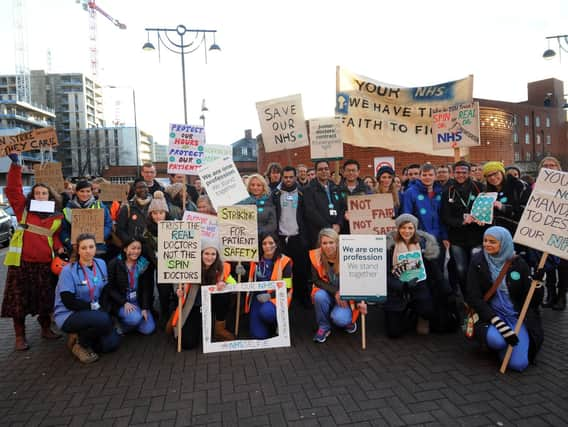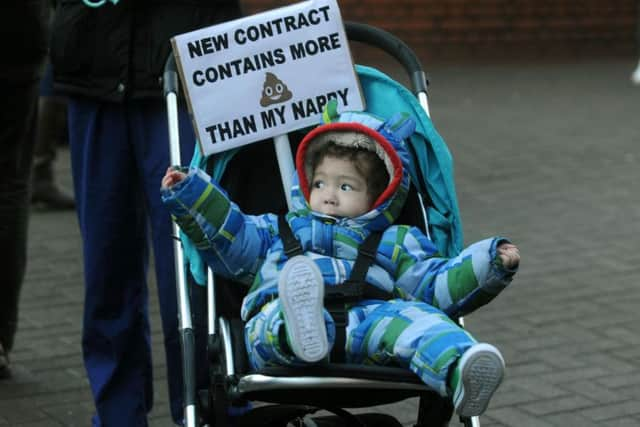Fresh talks over junior doctor contract organised amid fears more strikes could put lives at risk in Yorkshire


A spokesman for the Advisory, Conciliation and Arbitration Service (Acas) has revealed that talks between the British Medical Association (BMA) and the Government will resume tomorrow at 10am, continuing on Friday.
It comes after the breakdown in negotiations over junior doctor contract reform led thousands of trainees to strike during a 24-hour period of reduced ‘emergency care only’ staffing from Tuesday at 8am.
Advertisement
Hide AdAdvertisement
Hide AdPlacard-waving doctors surrounded every major hospital in Yorkshire on Tuesday to show their discontent over Government’s proposed changes to their working contracts, which the BMA sees as “unsafe and unfair”.


The news that the BMA and Government are set to lock horns in talks again comes after Health Secretary Jeremy Hunt declared Tuesday’s walk-out as “wholly unnecessary” after it resulted in 4,000 non-urgent operations being cancelled.
In Leeds more than 400 appointments and around 50 operations were disrupted due to the industrial action, while one West Midlands hospitals declared a “level four” major incident.
Mr Hunt had earlier said previous talks broke down despite 15 of 16 BMA concerns being resolved – a claim the union disputes.
Advertisement
Hide AdAdvertisement
Hide AdBMA council chair Dr Mark Porter said: “There are some serious issues about patient safety and recognition of junior doctors’ contributions that need to be sorted here and the very fact that Government documents refuse to acknowledge those issues is one of the things that makes the dispute more difficult to resolve.”


The BMA’s other planned strikes include a 48-hour period of emergency care only from January 26 and a full nine-hour walk-out on February 10.
Chris Hopson, chief executive of NHS Providers, was asked on BBC Radio 4’s Today programme whether patients will die as a result of a February 10 walk-out, should it go ahead.
“I do not think we can give that guarantee at this point,” he said. “Clearly everyone in the NHS will do everything they can to ensure that the right quality of the service is provided.”
Advertisement
Hide AdAdvertisement
Hide AdHe continued: “We just need everybody to get back around the table and resolve this. Disputes like this, to be honest, have happened over the last five or 10 years as contracts have been updated to reflect the need to provide 24-hour services, seven days a week.
“This is something that every other bit of the economy has done.
“The time has come for the NHS to do it so let’s get back round the table and agree.”
The BMA estimated that Tuesday’s industrial action saw junior doctors attend around 150 pickets nationwide.
Advertisement
Hide AdAdvertisement
Hide AdTrainees also staged local Meet the Doctor engagement events in Yorkshire, while some even helped in the Leeds flood relief effort by clearing warehouses in Kirkstall hit by Storm Eva.
The Government’s last contract offer to juniors includes an 11 per cent basic pay rise. But this is offset by plans to cut the number of hours on a weekend for which juniors can claim extra pay for unsocial hours.
The BMA argues that the proposed changes make the contract “unsafe and unfair” for both doctors and patients as it would also see working hour safeguards scrapped.
The Government says its changes are necessary in its aim for a “truly seven-day NHS”, while claiming that only around one per cent of doctors would lose pay.